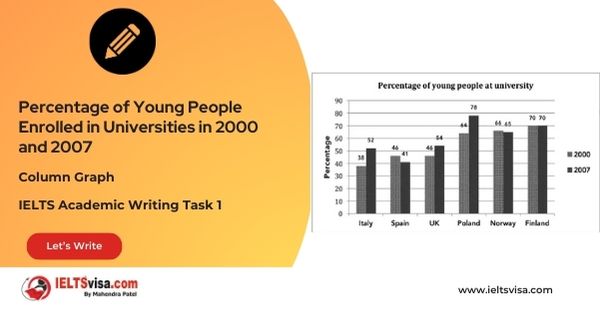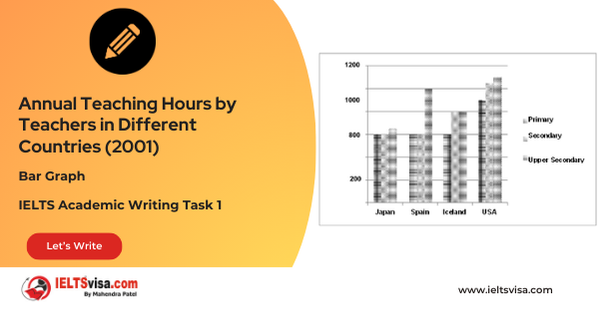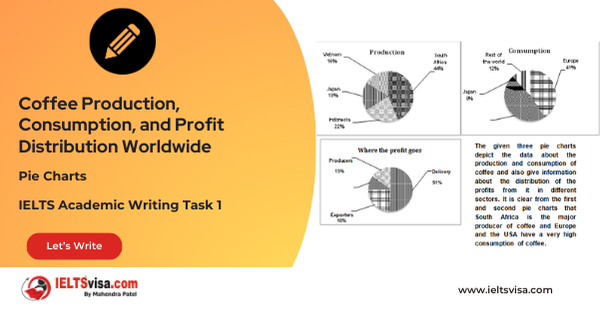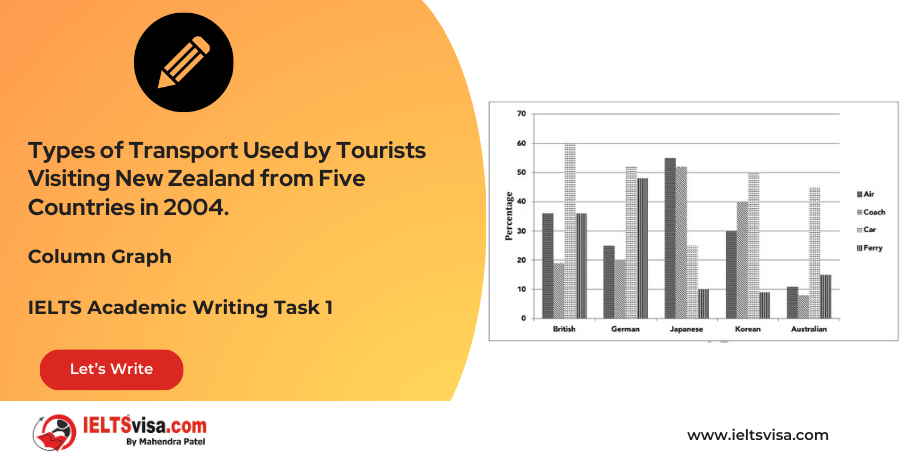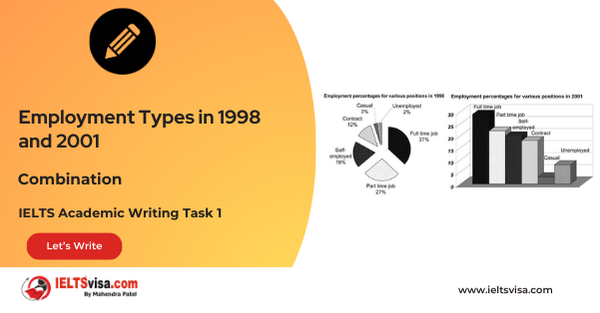Total Number of Cruise Passengers and Their Percentage by Age in 1975 and 2003 in the UK
IELTS Academic Writing Task 1 - Combination : Bar Graph , Table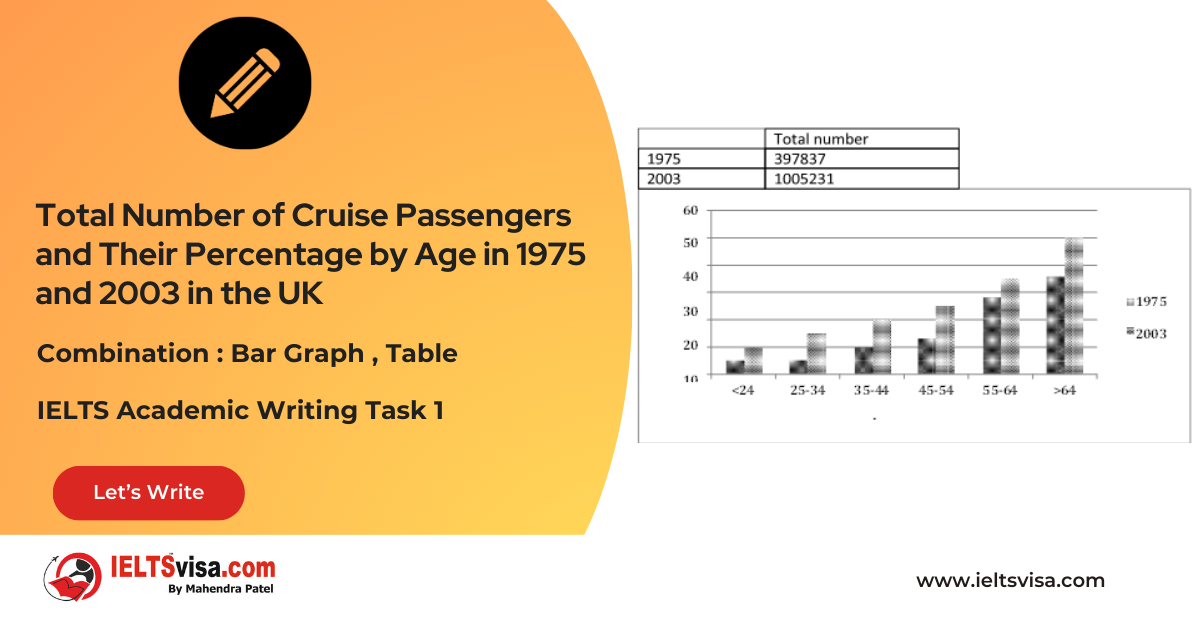
IELTS Writing Task 1 Question
120. The charts below show the total number of cruise passengers, and their percentage according to age in 1975 and 2003 in the UK.
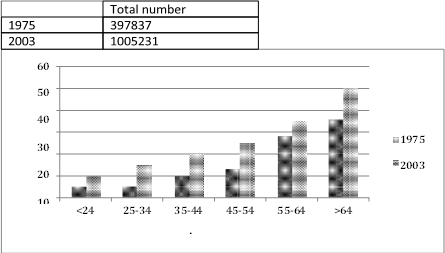
Common questions for the charts
1. Graph Type: Column graph (for percentage of cruise passengers by age) and Table (for total number of cruise passengers)
2. Title: Total Number of Cruise Passengers and Their Percentage by Age in 1975 and 2003 in the UK
3. What are the units of measurement?: Total number of cruise passengers (in thousands), percentage of passengers by age group
4. Who: British cruise passengers
5. When: 1975 and 2003
6. Where: The UK
7. Topic: Trends in cruise passenger numbers and demographics by age group
Process Showing and Trends
Comparison 1: Total Number of Passengers (1975–2003)
• Details:
1. In 1975, the total number of British cruise passengers was just under 400,000.
2. By 2003, the total number had more than doubled to just over 1,000,000.
Comparison 2 : Percentage by Age Group (1975–2003)
- Details:
1. The percentage of passengers from all age groups increased from 1975 to 2003.
2. The largest increase occurred in the 35-44 and 45-54 age groups, where the percentage doubled from 10% to 20% and 12% to 24%, respectively.
3. The 55-64 age group had the smallest increase, rising from 28% to 34%.
4. The 64+ age group had the highest percentage of cruisers in both years, increasing from 37% to 50%.
Sample Answer
The charts illustrate the total number of British cruise passengers and their proportion by age in 1975 and 2003.
In 1975, nearly 400,000 people went on cruises in the UK. This figure increased by more than two and a half times, reaching over 1,000,000 passengers by 2003. The column graph shows that the percentage of passengers increased for all age groups during the 28-year period.
The 35-44 and 45-54 age groups experienced the most significant rise in cruise attendance, with their percentage doubling from 10% to 20% and 12% to 24%, respectively. The 55-64 group saw a smaller increase, rising from 28% to 34%. The 64+ age group had the highest percentage of cruisers in both years, increasing from 37% to 50%. Meanwhile, the 25-34 and <24 age groups showed a moderate increase, with their percentage rising by 5% and 10%, respectively.
Overall, the data indicates that while the total number of cruise passengers increased, the popularity of cruising also grew among older age groups.
Top 25 Vocabularies
| Vocabulary | Meaning | Synonyms | Examples | Type |
| Discrepancy | A difference or inconsistency | Difference, variation | “The least discrepancy was seen in the 55-64 age group.” | Noun |
| Escalate | To increase or grow rapidly | Increase, rise | “The number of cruise passengers escalated from 1975 to 2003.” | Verb |
| Proportion | The percentage or share of something | Percentage, ratio | “The proportion of passengers aged 64+ increased from 37% to 50%.” | Noun |
| Moderate | Average or not extreme | Mild, moderate | “The 25-34 and <24 age groups showed a moderate increase in percentage.” | Adjective |
| Significant | Important or notable | Considerable, notable | “The 35-44 and 45-54 age groups saw a significant increase in cruise attendance.” | Adjective |
|
Illustrate |
To explain or clarify something with examples or visuals |
Depict, demonstrate |
“The charts illustrate the rise in cruise passengers.” |
Verb |
|
Proportion |
A part or share of a whole |
Percentage, ratio |
“The proportion of passengers aged 64+ increased significantly.” |
Noun |
|
Moderate |
Average or reasonable in amount |
Mild, moderate |
“The 25-34 and <24 age groups showed a moderate increase.” |
Adjective |
|
Significant |
Important or meaningful |
Considerable, major |
“The 35-44 and 45-54 age groups saw a significant rise in passengers.” |
Adjective |
|
Escalate |
To grow or increase quickly or intensely |
Surge, amplify |
“Cruise passenger numbers escalated by 2003.” |
Verb |
|
Surge |
A sudden, powerful increase |
Rise, jump |
“There was a surge in the number of passengers in 2003.” |
Noun/Verb |
|
Proportional |
Relating to or based on proportion |
Relative, corresponding |
“The increase in passengers was proportional to the age group.” |
Adjective |
|
Peak |
The highest point or level |
Climax, summit |
“The percentage of cruisers peaked in the 64+ group.” |
Noun/Verb |
|
Gradual |
Happening or changing slowly over time |
Slow, steady |
“The increase in cruise passengers was gradual.” |
Adjective |
|
Trend |
A general direction in which something is developing |
Movement, direction |
“The trend shows more older individuals taking cruises.” |
Noun |
|
Allocate |
To distribute or assign resources or tasks |
Assign, designate |
“The percentage of passengers was allocated across various age groups.” |
Verb |
|
Demonstrate |
To show clearly or explain through action or evidence |
Show, display |
“The data demonstrates a clear rise in cruise popularity among older groups.” |
Verb |
|
Fluctuate |
To change continuously, especially in an irregular way |
Vary, oscillate |
“Cruise attendance fluctuated slightly over the years.” |
Verb |
|
Consistent |
Remaining the same over time |
Steady, uniform |
“The percentage of 25-34-year-olds remained consistent.” |
Adjective |
|
Significantly |
In an important way, or to a large extent |
Considerably, markedly |
“The numbers of passengers increased significantly in 2003.” |
Adverb |
|
Shift |
A slight change or movement in position or direction |
Change, alteration |
“There was a shift in the popularity of cruises across age groups.” |
Noun |
|
Increase |
To become greater or larger |
Rise, growth |
“The number of cruise passengers increased significantly by 2003.” |
Verb/Noun |
|
Dramatic |
Striking, marked by a large or noticeable change |
Striking, substantial |
“The 64+ age group showed a dramatic increase in cruise attendance.” |
Adjective |
|
Fluctuation |
A continuous change or variation |
Variation, instability |
“The fluctuation in cruise attendance showed a trend of growing numbers.” |
Noun |
|
Attain |
To reach or achieve something |
Achieve, accomplish |
“The 35-44 and 45-54 age groups attained the highest percentage of attendance.” |
Verb |

Our Books
Master IELTS Speaking Part 1
IELTS Writing Task 1 Book
IELTS Writing Task 2 Book
Practice IELTS Other Modules
IELTS Listening
The IELTS Listening test assesses how well you can understand spoken English in various contexts. It lasts about 30 minutes and is divided into four sections with a total of 40 questions. The listening tasks become increasingly difficult as the test progresses.
IELTS Academic Reading
The IELTS Academic Reading section assesses your ability to understand and interpret a variety of texts in academic settings. It is designed to evaluate a range of reading skills, including skimming for gist, reading for main ideas, reading for detail, understanding inferences, and recognizing a writer's opinions and arguments.
IELTS Speaking
The IELTS Speaking test assesses your ability to communicate in English on everyday topics. It lasts 11-14 minutes and consists of three parts: introduction, cue card, and a discussion based on the cue card topic.
IELTS General Reading
IELTS General Reading tests your ability to understand and interpret various types of texts. Here are some key areas and types of content you can expect to encounter in the reading section, along with tips for effective preparation.
IELTS Academic Writing Task 1
In IELTS Academic Writing Task 1, you are presented with a visual representation of information, such as graphs, charts, tables, or diagrams, and you are required to summarize, compare, or explain the data in your own words.
IELTS General Writing Task 1
In IELTS General Writing Task 1, you are required to write a letter based on a given situation. The letter can be formal, semi-formal, or informal, depending on the prompt. Here’s a breakdown of the key components to include in your letter
IELTS Academic Writing Task 2
In IELTS Academic Writing Task 2, you are required to write an essay in response to a question or topic. Here’s a guide to help you understand the essential elements of this task
IELTS Exam Tips
To succeed in the IELTS exam, practice regularly, familiarize yourself with the test format, improve your vocabulary, develop time management skills, and take mock tests to build confidence.
Grammer for IELTS
Grammar is the foundation of effective communication in English. Understanding tense usage, subject-verb agreement, and sentence structure enhances clarity and coherence in writing and speaking.
Vocabulary for IELTS
Vocabulary plays a crucial role in the IELTS (International English Language Testing System) exam, especially in the Speaking and Writing sections. Here’s an overview of why vocabulary is important and how it impacts your performance
RECENT IELTS SAMPLES QUESTIONS AND ANSWERS
Task 1 – Column graph – Percentage of Young People Enrolled in Universities in 2000 and 2007.
20:00 Start Pause Stop [df_adh_heading title_infix="IELTS Writing Task 1 Question" use_divider="on"...
Task 1 – Bar Graph – Annual Teaching Hours by Teachers in Different Countries (2001)
20:00 Start Pause Stop [df_adh_heading title_infix="IELTS Writing Task 1 Question" use_divider="on"...
Task 1 – Pie Charts – Coffee Production, Consumption, and Profit Distribution Worldwide
20:00 Start Pause Stop [df_adh_heading title_infix="IELTS Writing Task 1 Question" use_divider="on"...
Task 1 – Column graph – Types of Transport Used by Tourists Visiting New Zealand from Five Countries in 2004.
20:00 Start Pause Stop [df_adh_heading title_infix="IELTS Writing Task 1 Question" use_divider="on"...
Task 1 – Bar and Pie Chart Combination – Employment Types in 1998 and 2001
20:00 Start Pause Stop [df_adh_heading title_infix="IELTS Writing Task 1 Question" use_divider="on"...
Task 1 – Diagram – Comparison of Stone Tool Development Over Time
20:00 Start Pause Stop [df_adh_heading title_infix="IELTS Writing Task 1 Question" use_divider="on"...

